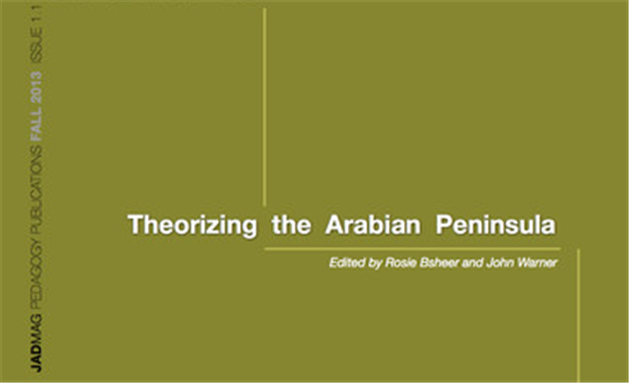Theorizing the Arabian Peninsula
Edited by Rosie Bsheer and John Warner
Electronic copy: $4.99
Paperback: $7.49
Combo: $9.99 
A number of significant developments in the region make this an opportune moment to revisit our first JADMAG, Theorizing the Arabian Peninsula, edited by Rosie Bsheer and John Warner. The contributing authors’ concerns that rentier state theory obscures the fundamental dependence of national petroleum economies on a global capitalist labor market have been reinforced by recent investigations into the scale of migrant worker deaths in Qatar, home of the 2022 World Cup. The tensions identified in this issue concerning the entanglements of knowledge production with finance capital, labor regimes, and state politics have also been given new importance in light of the centrality of New York University’s satellite campus to the Saadiyat Island project, where inhumane labor conditions have also been documented. Questions of spatial imaginaries and sovereignty that the authors analyzed a year ago are today increasingly relevant in Yemen, where the territorial expansion of the Huthi movement, the intensification of the southern secessionist movement, and the resolution of the Yemeni National Dialogue to adopt a federal system with six newly-drawn provinces have posed new challenges to the historicity of the nation-state.
Despite the sophisticated, critical, and oft-politically engaged literature emerging from and about the Arabian Peninsula, the region remains marginalized, in multiple ways, within academic and popular analyses. Theorizing the Arabian Peninsula addresses the ways in which frameworks of knowledge production have not only obscured social realities there, but also contributed to their construction. While our roundtable contributors—Madawi Al-Rasheed, Adam Hanieh, Toby Jones, Nathalie Peutz, Neha Vora, and John Willis—approach this project from a number of different disciplinary perspectives and theoretical standpoints, several key themes surface from their critical engagements. Rethinking the relationship between oil and politics emerges as perhaps the preeminent concern, with rentier state theory coming under sustained critique.
In confronting the work that knowledge production does in the creation of structures of political domination and economic exploitation, we must remain attentive to the historical processes by which the “Middle East” has been constructed as a conceptual object of European and US imperialism and Cold War politics. The challenge for us, here, is to reconceptualize our objects of analysis to illuminate these power relations and the multiple ways in which they have effected far-reaching transformations of the political, cultural, and material infrastructures of everyday life in the Arabian Peninsula. Approaching knowledge, space, identity, economy, and the political as contested and historically constituted—as the contributors to this roundtable urge us to—thus serves to relocate the peninsula within broader circuits of power, capital, labor, migration, and religion, from which they have long been analytically severed.
A subsidiary of the Arab Studies Institute,Tadween Publishing seeks to institutionalize a new form of publishing press by contributing to breaking down barriers and preconceived notions of the publication world.

![Now Available at Tadween Publishing in Partnership with Tadamun: "Planning [in] Justice العدالة في التخطيط"](https://kms.jadaliyya.com/Images/135x94xo/covers210326041535580~.png)














